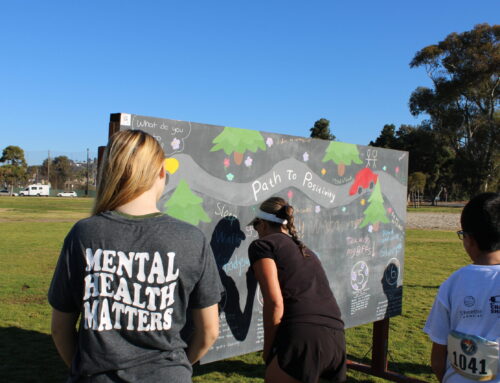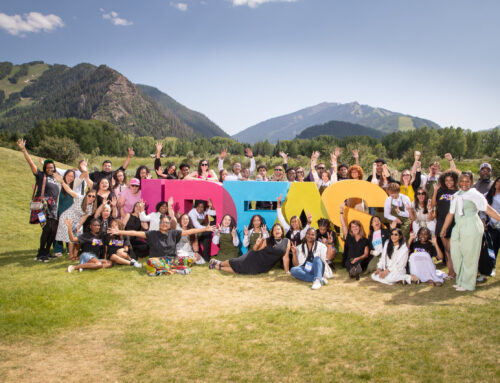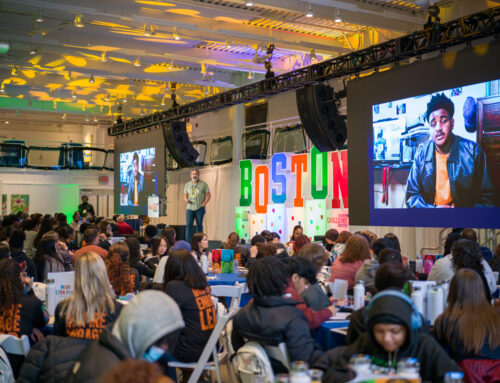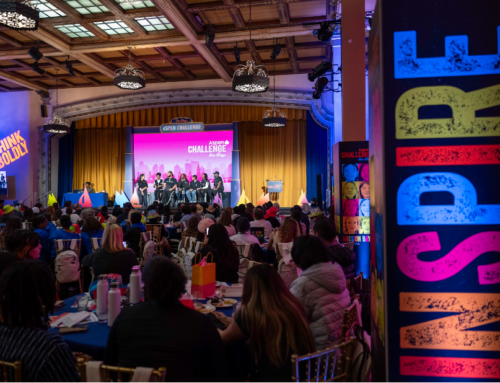The Power of Community in Protest and Imprisonment, by Ari Tulay
For Ariana Tulay, a participant of the Aspen Challenge in 2019, her journey with activism started long before she marched in protest of the killing of Breonna Taylor in Louisville, Kentucky. Once she was invited into spaces to share her voice – places where people valued her ideas – she realized she had something to say and had the power to make a change. For her, Aspen Challenge was one of these places. “The Aspen Challenge made me realize I do not have to do these things alone. It helped me learn what family means.” In the story below, Ariana recounts her experience of joining a family of 1,000 protesters, the injustice that followed with her subsequent arrest, and the call to raise awareness for the injustice she and Communities of Color endure every day.
The trauma inflicted on me as a Person of Color did not start with this protest and arrest; this was simply a continuation of it. I looked at the clothes I was wearing that day and pictured what my mugshot would look like. I was prepared. From where I parked to where I got arrested, I knew the implications of this type of work. However, I knew the personal price that we all must pay is well worth the positive systemic change we can influence.
On that day, I joined a group of about 1000 people in protest. As an individual person, you always feel and know that you matter, that your life should not be taken for granted. As an individual, you recognize that systemic injustice is unfair, but when you feel that agreement from a crowd—people on your left, on your right, in front of you, behind you, all around you—there is a level of group consciousness, of recognizing that we matter, that is an incredibly beautiful and a powerful thing.
As we walked down Broadway in Louisville, Kentucky, a police barrier formed, and they began throwing tear gas and shooting pepper bullets. We saw the crowd of protestors immediately try to protect themselves and their friends. We began to run away as the smoke was starting to envelop the street. We moved down another street and ended up cornered by police again. No matter which way we turned, there were police. But we kept chanting, “No justice, no peace.” We were saying Breonna Taylor’s name. We were trying to stand up for what we believe in even when we were being silenced by the same oppressive force we were protesting.
Then the arrest came. We were trying to march peacefully and avoid the police officers. They kept boxing us in, and finally, when we were boxed in, they started with tear gas and pepper bullets, shooting at us. As we were being shot at and herded, we were surrounded by about 30 police officers in riot gear. They were yelling at us to get down. They were shouting, “Get on the ground! Get on the ground!” Matthew Kaufmann, my former teacher and one of the coaches of my Aspen Challenge team, his fiancé, Stephanie, and I were holding each other’s hands—coughing from the tear gas. We could not believe this was happening. The cops zip tied our hands behind our backs, read us our rights, and threw us in the back of the paddy wagon. One girl was crying and crying. We were trying to calm her down and tell her to breathe as if we were old friends. The community was immediate: when we entered that van, we were bonded in the fellowship of social justice.
Once at the police station, we were taken one by one out of the police vehicle and handcuffed along long chains. About 100 of us were crammed into a confined holding space. It was a mix of officers’ occasionally yelling at us, each of us calling the Bail project for a lawyer, police writing down our “charges”, and bringing us one by one through booking to the holding cell. When we were taken upstairs, they packed 30 of us into a cell. As every woman entered the cell, we would urgently ask, “What time does your bracelet say?”—a tag they put on each of us which states the exact time we were officially booked at the station— hoping that the time was going by quickly.
As more time passed, we continued to talk about our lives, our activism, and our families. We even ended up talking about astrology. If there was ever a time to build community and unity, it was together in jail, because we were all going through the same thing. We had risked our livelihoods to stand up for what we knew was necessary. We knew that we were lucky to be arrested. George wasn’t allowed to go jail before he was sentenced to death without a trial. Breonna wasn’t allowed the “luxury of jail” when she was killed as she was sleeping in her own home. We knew how lucky we were, even in a cramped cell with the threat of COVID-19, with no blankets and no water. We were still “lucky.” However, that is where our “luck” ended as we were not released from jail for more than 24 hours after we were arrested. When we were released, we were let out past curfew into the same environment they had just arrested us in.
For the People of Color being held, we were not surprised by the injustice that we endured—no water, no blankets, no one could get medicine—but for the White women who were held, it opened their eyes. For me, someone who is a Woman of Color who has experienced race-related trauma before, this was not the most traumatic event I’ve ever experienced. And that’s the problem.
For the People of Color, this injustice, deprivation of resources, and disrespect were exactly what we expected.
We must continue to highlight and raise consciousness that, yes, you may think this experience is terrible, but there’s always more. You see George Floyd, and you see Breonna Taylor, and it is horrible. But there’s more. This isn’t just a flash in the pan. We cannot have this sensationalism around Black Lives Matter for a month and then move on to something else. We must keep fighting because there is so much more justice to fight for. The revolution for justice and systemic change is not optional.
Ariana Tulay is a 19-year-old community activist from Louisville, Kentucky, and a sophomore at Northern Kentucky University, where she’s pursuing degrees in political science and philosophy, with a minor in social justice. Her mission is to elevate disenfranchised voices and help create change around systemic injustices. Her passions are bridging the socioeconomic gap of activism and raising cultural consciousness against ignorance. A spoken word artist, Tulay started her activism journey in high school, where she led student-teacher marches that promoted immigrant inclusivity. Today, she is often organizing, speaking, and nonviolently protesting; recently she was arrested for her protest and held for over 30 hours. Tulay intends to enroll in law school and become a law professor specializing in social-justice-originated reform. She is an alumna of the Aspen Challenge: Louisville.





